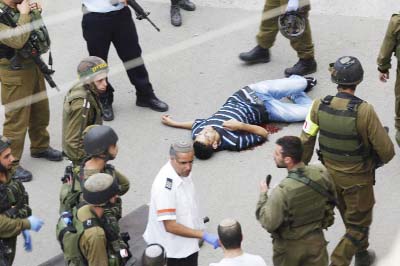
AP, Jerusalem :Prime Minister Benjamin Netanyahu has ordered a review of the status of certain Palestinian neighbourhoods in east Jerusalem, an official confirmed on Monday, a decision that could potentially strip tens of thousands of Palestinians of their Israeli residency rights.Such a move is unlikely to overcome Israeli legal hurdles, but the very prospect has unnerved Palestinians in the city. The review comes after weeks of Israeli-Palestinian violence, much of it concentrated in east Jerusalem, the section of the city claimed by the Palestinians for their future capital. Many of the Palestinian attackers involved in deadly assaults came from east Jerusalem neighbourhoods. Any move to change the status of the city’s Palestinians would threaten unleashing new unrest and draw international condemnations.The current round of violence began last month with clashes at Jerusalem’s most sensitive holy site, a hilltop compound in the Old City that is revered by Jews and Muslims. The clashes quickly spread to other areas of east Jerusalem, across Israel and into the West Bank and Gaza Strip.In all, 10 Israelis have been killed, mostly in stabbings, while 51 Palestinians, including 30 identified by Israel as attackers, have been killed by Israeli fire. Palestinian neighbourhoods in east Jerusalem have experienced frequent clashes between stone-throwing youths and Israeli security forces.The Israeli official said that Netanyahu recently ordered a review of Palestinian neighbourhoods located outside of Israel’s West Bank separate barrier. Roughly-one third of the city’s Palestinian population, about 100,000 people, live outside the barrier.Israeli rights groups, citing official Israeli statistics, say a total of about 14,000 Palestinians have lost residency rights since 1967.Israel’s West Bank separation barrier, built a decade ago, slices through Arab neighborhoods of Jerusalem, leaving about 100,000 city residents on the “West Bank” side of the barrier.Netanyahu has said the current wave of violence is the result of Palestinian incitement. But Palestinians say it is the result of years of Israeli occupation, failed peace efforts and dwindling hopes of ever gaining independence.Neighbourhoods in east Jerusalem suffer from poor infrastructure, and a lack of classrooms, resources and services when compared to wealthier Jewish neighborhoods. Some 75 per cent of the city’s Palestinians live in poverty, according to Israeli statistics.Meanwhile, Fresh anti-Israeli violence saw three Palestinians shot dead in the West Bank while efforts to douse tensions over Jerusalem’s Al-Aqsa mosque compound by installing cameras at the site ran into trouble.A surge of violence in the conflict showed no sign of abating as Palestinians, most of them teenagers from the powder-keg city of Hebron, staged more lone-wolf knife attacks against Israeli soldiers and clashed with troops in the occupied West Bank.Stabbings and violent protests have become daily occurrences since simmering tensions over the status of the Al-Aqsa mosque compound in Jerusalem’s Old City boiled over in early October, leaving scores dead.

